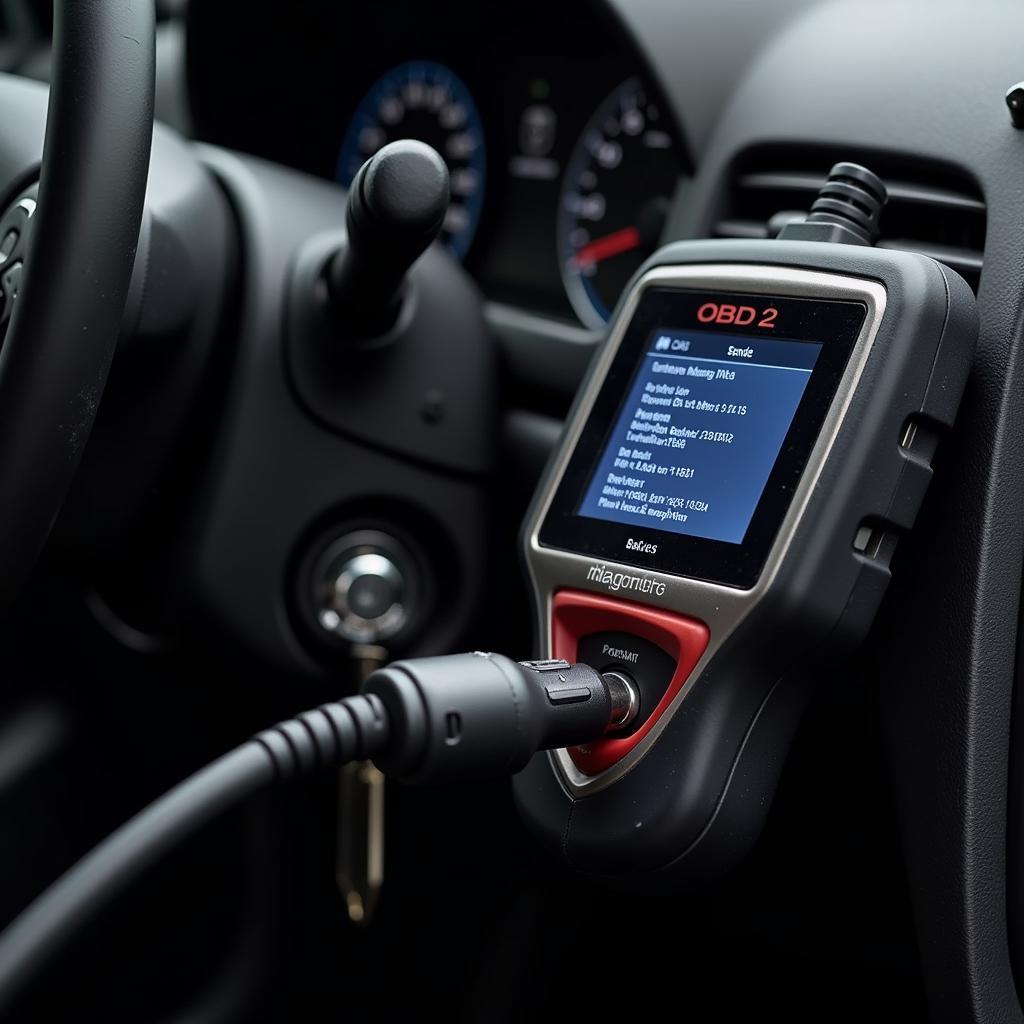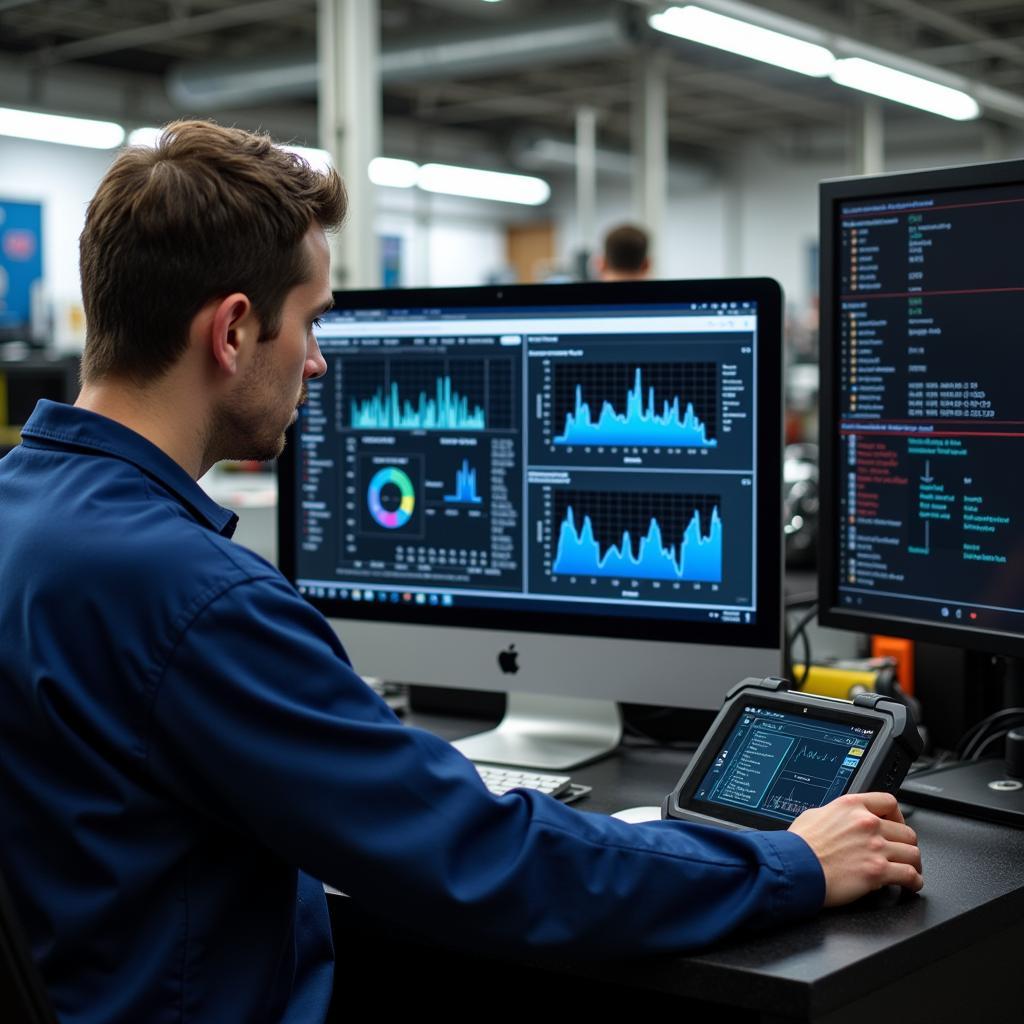Modern vehicles are increasingly reliant on sophisticated computer systems to manage everything from engine performance to safety features. These systems generate a wealth of data, leading many car owners to wonder: Do Diagnostic Machines Store Car History? The answer is a bit more complex than a simple yes or no. Let’s delve into the world of car diagnostics, explore the type of information these machines can access, and understand their implications for car owners.
Understanding Car Diagnostic Machines
Diagnostic machines, also known as OBD2 scanners, act as a window into your vehicle’s computer system. They connect to the onboard diagnostics port (OBD-II port) typically located under the dashboard on the driver’s side. These machines come in various forms, from basic handheld devices to advanced software used by professional mechanics.
 Car Diagnostic Machine Connected
Car Diagnostic Machine Connected
What Information Can Diagnostic Machines Access?
Contrary to what some might believe, diagnostic machines don’t store car history like a comprehensive logbook. They primarily provide a snapshot of your vehicle’s current health and performance. Here are some key data points they can access:
- Diagnostic Trouble Codes (DTCs): These codes are triggered when the car’s sensors detect an issue within a specific system. DTCs are like clues, pointing mechanics towards potential problems.
- Freeze Frame Data: This provides a snapshot of various engine parameters at the exact moment a DTC was triggered, helping pinpoint the cause of the issue.
- Vehicle Identification Number (VIN): This unique code identifies your car and can be used to access manufacturer-specific information and repair procedures.
- Emissions Data: Diagnostic machines can check your car’s emissions system, ensuring it meets environmental regulations.
- Mileage: Some scanners can access and display your car’s current mileage.
What About Historical Data?
While diagnostic machines primarily focus on real-time data, they can offer glimpses into your car’s history. However, the extent of this historical data is limited and depends on factors like:
- Vehicle Make and Model: Different manufacturers have different data storage protocols. Some may store more historical data than others.
- Type of Diagnostic Machine: Advanced scanners used by dealerships and specialized workshops can often access more detailed historical information.
- Data Erasure: Mechanics and even car owners can erase certain types of stored data, limiting the historical information available.
Common Misconceptions About Diagnostic Machines
The capabilities of car diagnostic machines are often misunderstood. Here are some common misconceptions:
- They Can Reveal Every Past Repair: Diagnostic machines don’t keep a detailed record of every repair or maintenance task performed on your car.
- They Can Track Your Driving Habits: While they can access data like speed and mileage, they don’t typically store continuous driving history like GPS location or speed over time.
- They Can Be Used To Tamper With Your Car: While technically possible in the wrong hands, diagnostic machines primarily serve as diagnostic tools.
 Mechanic Using Diagnostic Machine
Mechanic Using Diagnostic Machine
Car Diagnostic Services in Cranbourne North
If you’re seeking reliable car diagnostic services in Cranbourne North, look no further. Our team of expert technicians utilizes state-of-the-art diagnostic equipment to identify and resolve any issues with your vehicle. We prioritize transparency and provide you with a comprehensive understanding of your car’s health.
The Importance of Regular Diagnostic Checks
Just like regular doctor visits, periodic car diagnostic checks are crucial for maintaining your vehicle’s health and identifying potential problems early on. These checks can help prevent costly repairs down the line and ensure your car operates at peak performance.
Conclusion
Diagnostic machines play a vital role in modern car maintenance, providing valuable insights into your vehicle’s health. While they don’t store car history in the same way a comprehensive logbook might, they offer a glimpse into past issues and crucial real-time data. Understanding their capabilities and limitations empowers car owners to make informed decisions about their vehicle’s maintenance and repairs. For any diagnostic needs or concerns, always consult with a qualified mechanic.
FAQs
1. Can a diagnostic machine tell me when my car was last serviced?
Diagnostic machines don’t store specific service dates.
2. Can I buy my own diagnostic machine?
Yes, various OBD2 scanners are available for purchase, ranging from basic to advanced models.
3. What should I do if my check engine light turns on?
It’s crucial to get your car diagnosed by a mechanic as soon as possible to identify and address the underlying issue.
4. Do all cars have an OBD-II port?
Most cars manufactured after 1996 are equipped with an OBD-II port.
5. Are car diagnostic tests expensive?
The cost varies depending on the complexity of the issue and the rates of your chosen mechanic. However, many shops offer free or discounted diagnostic checks.
Need help with car diagnostics?
Contact us via WhatsApp: +1(641)206-8880, Email: [email protected]. Our dedicated customer support team is available 24/7 to assist you. You can also explore our car diagnostic services in Auckland.

Leave a Reply